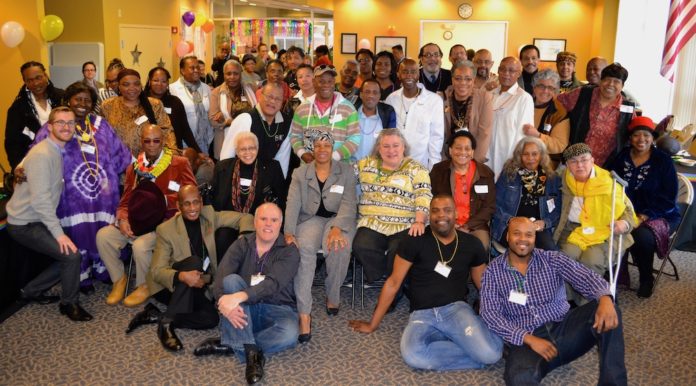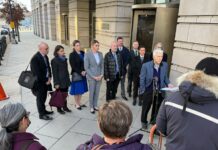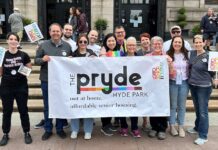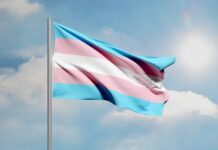[This column appears in the November/December 2021 issue of Boston Spirit magazine. Subscribe for free today.]
On September 8, the LGBT Elders of Color, a program of the Multicultural AIDS Coalition (MAC), hosted an evening of live storytelling called “Stories of our Inheritance: An Evening of Memory Sharing with LGBT Elders of Color.” This event was held at Soleil Restaurant in Nubian Square and was cosponsored by The History Project, whose mission is dedicated to documenting and archiving New England’s LGBTQ history.
Every one of the guests gathered for this event was filled with such joy, not only at the chance to be together again in person, but also to relive wonderful memories of a time when Boston’s Black Gay Scene was in its prime. There was also another agenda present. This was a chance for this group to claim their place in Boston’s history.
One of the themes that ran throughout many of the stories that evening was the feeling that everyone had the moment they stepped into a Black gay club for the first time. Shirley Royster said “I stepped into a place where people looked just like me…and they were dancing together. This was music to my ears!” During his sharing, Donnell Graves from Dorchester said “I knew I was gay since I was six, but my gay life didn’t start until the ’80s when I discovered the gay clubs. I saw a whole room full of men who were dancing—it was the first time I had ever seen that, and I felt right at home. Everyone was proud and happy and excited to be gay.”
The setting for this evening of storytelling could not have been more perfect. Soleil has been the home for Flashback Café, a monthly supper club for LGBT elders of color and their friends. But more importantly is its location in the center of Nubian Square. This part of Roxbury, originally known as Dudley Square, is the heart of the Boston’s Black community and the neighborhood where Elite, the one and only Black gay bar, once stood.
Another fond memory raised that night that needs to take its rightful place in Boston’s history is the role of the Black gay house parties. Some of these were incredibly elaborate, themed parties. Curtis Pearson, from Dorchester, came onto the stage to tell his story carrying his silver lame shirt, which he said was from ‘100 lbs. ago!’ “The house parties were always tits-to-ass crowded, and it would take you 30 minutes to get from one side of the room to the other. But you would find the most gorgeous Black men in Boston there all dressed in splendid attire.” Pearson said many of the people he met at the house parties have become lifelong friends, but sadly more than half of them passed away from AIDS.
One of the reasons that the Black gay club scene and the house parties were so important to LGBTQ people of color in those years was the freedom of having a place of their own. So many of the speakers shared about the challenges of navigating the white gay club scene which was not very welcoming to people of color. Eaton spoke about going to the Elite Restaurant and going to the back where the curtain separated the restaurant from the dance club. He spoke about the entrance everyone would make when they pulled the back the curtain, took a deep breath and stepped into the club. But it was seeing “all these Black folks coming together, there was a flavor, a specialness, this was our place and we didn’t need to navigate any white spaces to be here.”
Eaton went on to say “This was such a wonderful time. I don’t think I appreciated how much Black spaces meant to me then, but now I understand how important they are. Now we need to pass down the stories about the Boston gay movement. The ones we have been told about Gay Liberation and Stonewall, those are all told through a white lens. We have a lens too. We have to put that out there so people see that lens and know we were here. We were in the white spaces and in the white clubs, but there were also Black gay dance clubs, Black gay social groups, house parties and a whole community of Black gay people. People who knew each other. It is important to not forget our presence in history.” Eaton ends his sharing by asking everyone to raise a glass to the “brothers, sisters and trans folks of color that didn’t make it.”
One of the hallmarks that makes the LGBT Elders of Color group so special is that they come together as a community—men, women and transgender adults; unlike so much of the LGBTQ community that is often segregated by gender and other divisions. Mercedes Thompson from Dorchester started her story by saying she was excited to share some memories because she has “been around the block,” which translates to being “old!” Thompson was interested in the Women’s Movement when she came to Boston in 1975. The Women’s Movement then was big, but it was “too white.” She wanted opportunities to bring Black and Latina women together, so she and Margot Ray started Wednesday Night’s at The Saint. The Saint was a lesbian bar and on Wednesday nights they dedicated the back room, normally the dance floor, just for women of color, and they posted someone at the door to make sure white women gave them their space.
At one point in the evening someone in the audience asked Paul Glass, the host of the evening and the Program Coordinator for the LGBT Elders of Color at the MAC, to come out on stage and speak about “Just Us” since it had been mentioned in passing but deserved more attention. Paul shared his memories that Just Us was a social group for professional Black gay men. It was another example of people in the Black community carving out a space for themselves to network and socialize. There were Black executives from some of the big companies in Boston, and Glass credits his success in life from those early mentorships.
Throughout the evening nearly every single storyteller mentioned the club Elite at some point in their story. It was a central meeting point where so much of the weekly Black gay scene originated. There was such nostalgia and fondness for the club. At the end of the evening, one of the final speakers stood up and told the group he was going to set the record straight and tell the real story of Elite since it was because of him that it was created. Danny Harris of Boston spoke about the night he said he had enough of being treated so poorly at the white gay clubs. He was being ignored by one of the bartenders at the 1270 and stormed out of the club. Harris moved back and forth between the gay and straight worlds, so he went right to some friends who had a Black-owned restaurant, Elite, in Roxbury and asked them if they would consider reserving one of the weekend nights as a gay night. The rest is history.
Although the evening was billed as stories from LGBT Elders of Colors, one of the final speakers was not an elder. Chastity Boswick, 36, from Boston is the executive director of Transgender Emergency Fund of Massachusetts. Boswick spoke about similar challenges in navigating spaces, but she spoke about not feeling welcome in the LGBT community. After listening to all the stories about the vibrant Black gay scene, Boswick shared that as a trans woman of color “there is an absence of a scene for transgender people. I always have to worry about opening up and being my true self. I never know if I am putting myself in harm’s way.” She wondered where the spaces were like the ones reminisced about at this event where she can find support and love. Boswick ended her sharing with a plea for the LGBTQ community to come together and support each other across the generations and all the other things that divide us as a community.
There was something unspoken that night but so clearly understood. This was the beauty of aging together. The gift to having incredible memories of the times when you first came out and the richness of still being surrounded by those same people decades later. That is something that few people in the LGBTQ community can claim, but it is an essential feature in Boston’s Black gay community.
Micha Broadnax, community curator fellow for The History Project, shared a few words that really captured the importance of this wonderful event “It is important that you are all here, you all existed, you all survived, enjoyed life and danced and that you are still here creating more memories.”
Thanks to the work of Paul Glass and Shirley Royster, Boston’s LGBT Elders of Color will continue making memories. Maybe the house parties have turned into supper clubs, but there is just as much laughter and storytelling and dancing as there was in this same neighborhood 40 years ago! [x]
For more on Flashback Café or LGBT Elders of Color at the MAC, email flashbacksundayeoc@gmail.com.
Bob Linscott is assistant director of the LGBTQIA+ Aging Project at The Fenway Institute.
Not a subscriber? Sign up today for a free subscription to Boston Spirit magazine, New England’s premier LGBT magazine. We will send you a copy of Boston Spirit 6 times per year and we never sell/rent our subscriber information. Click HERE to sign up!










